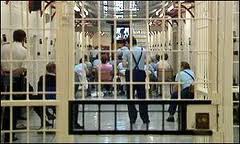 Gauguin's Girl in Front of Open Window
Gauguin's Girl in Front of Open Window In the latest news, suspects in the theft of priceless artworks have offered to return them in exchange for moving their trial from Romania to the Netherlands. They are accused of stealing seven masterpieces from Rotterdam's Kunsthal museum last October.
 Picasso's Harlequin Head
Picasso's Harlequin Head Artworks stolen from Kunsthal Museum:
Pablo Picasso's 1971 Harlequin Head
Claude Monet's 1901 Waterloo Bridge, London (above) and Charing Cross Bridge, London
Henri Matisse's 1919 Reading Girl in White and Yellow
Paul Gauguin's 1898 Girl in Front of Open Window
Meye de Haan's Self-Portrait from around 1890
Lucien Freud's 2002 Woman with Eyes Closed
The works have been valued at around 18m euros (£15m; $24m).
But, should thieves be jailed at all?
In a pamphlet released by the Howard League for Penal Reform, the charity said more people were sent to prison for theft or handling stolen goods than for any other crime. According to the UK Ministry of Justice, 19,293 people were sentenced to immediate custody for theft and handling stolen goods in England and Wales in 2012.
Should jail be reserved for offenders who commit crimes of a violent, sexual or threatening nature?
 news.bbc.co.uk
news.bbc.co.uk But a spokesman for Victim Support said the type of crime was not a reliable indicator of how much impact an offence had had on a victim.
If offenders knew they could keep committing certain types of crime and never be jailed, it might encourage further thefts. Also, the public would lose confidence in the system.
Rest assured. The UK government has no intention of changing the law to prevent judges sending thieves to prison.
In our UK society, each person has equal rights. Although prisons are bursting at the seams with inmates, criminals can expect good treatment and be housed and fed with plenty of perks like the best television programs while they serve their time. (Nobody would call their stay in prison a 'sentence'.) Instead, what if they were sent to an island and left to fend for themselves? What if they were sent to do mine-sweeping duty in a war zone? Or, in thefts from the elderly and vulnerable, what if they were forced to work for the person from whom they stole for the rest of either one of their lives?

 RSS Feed
RSS Feed






